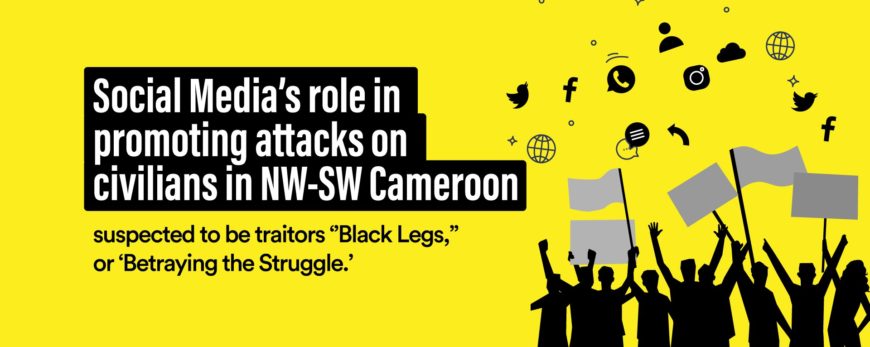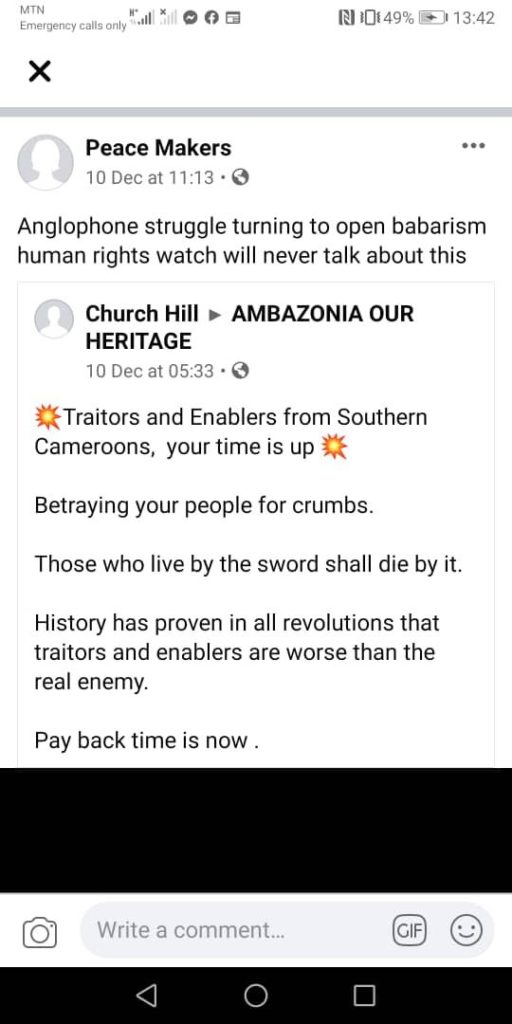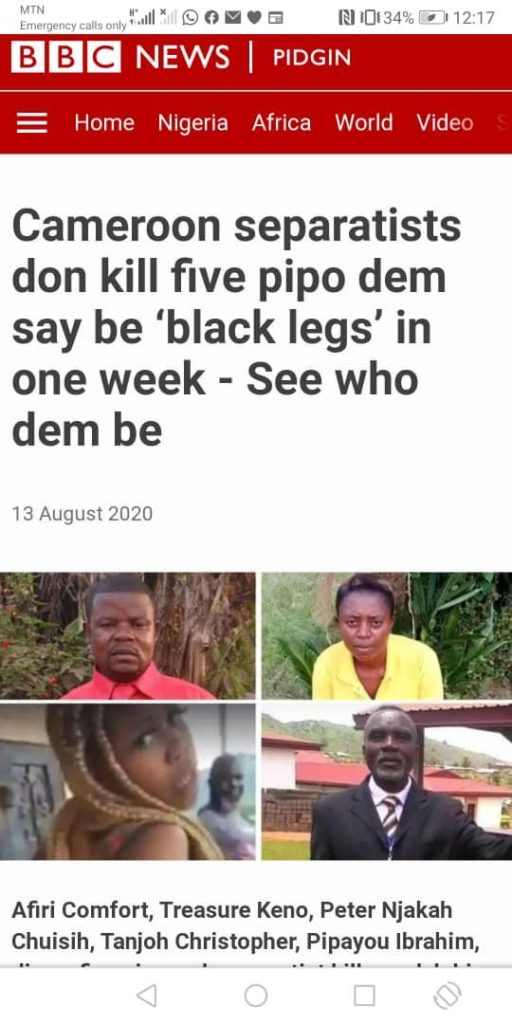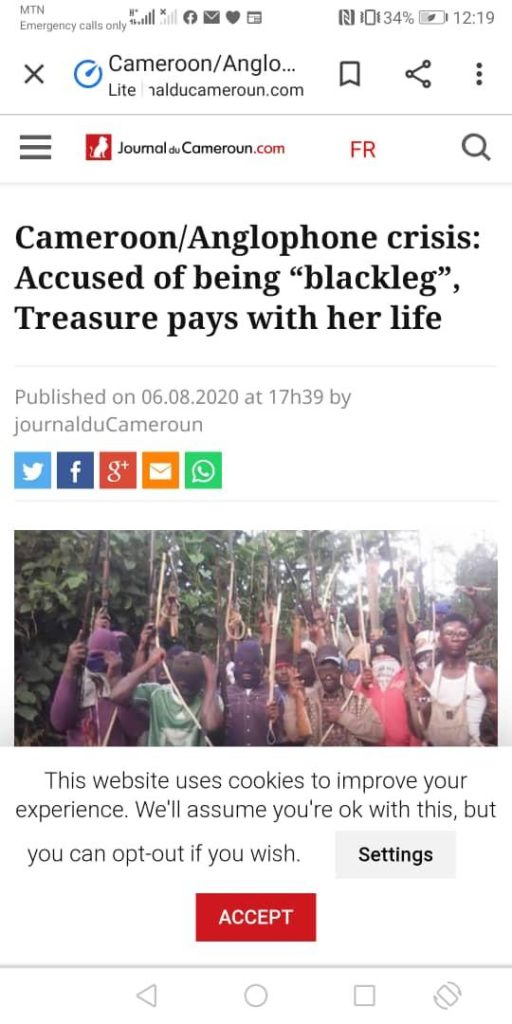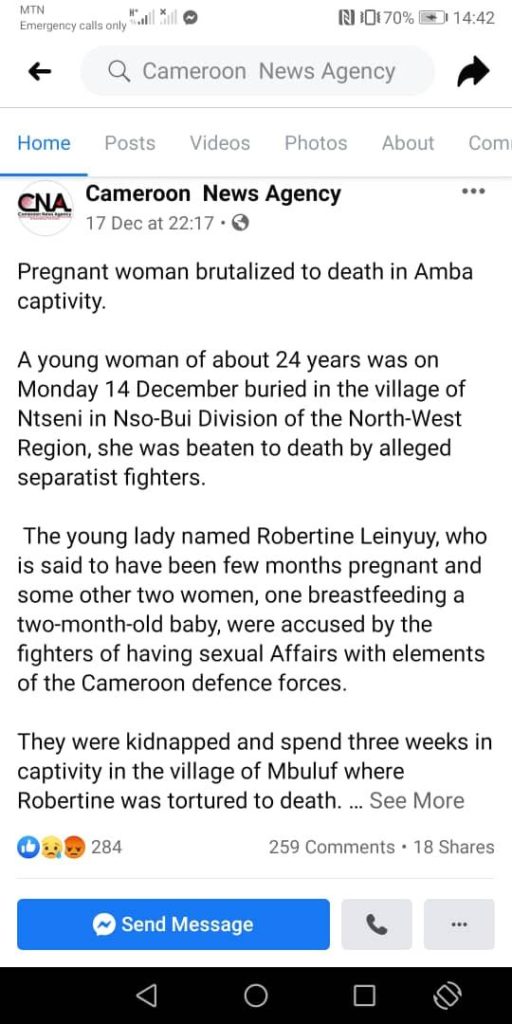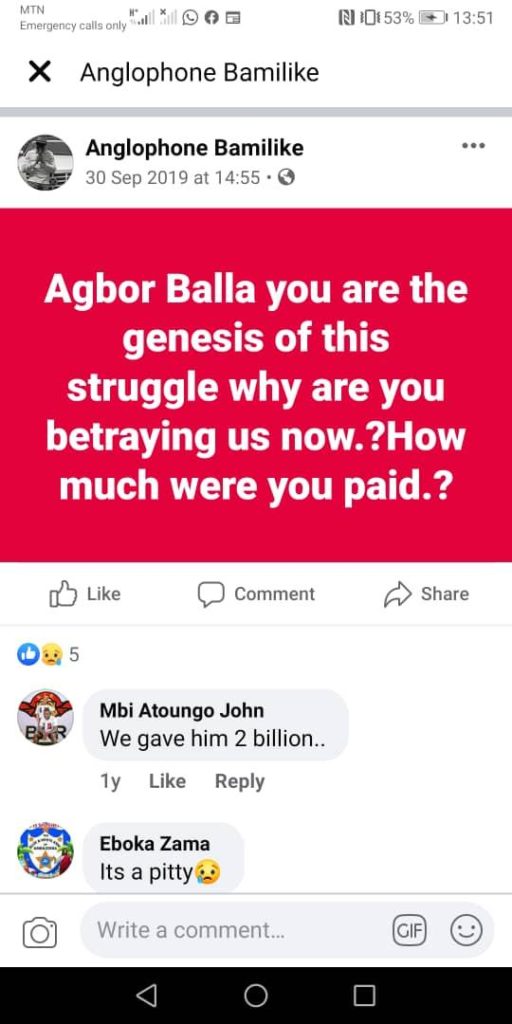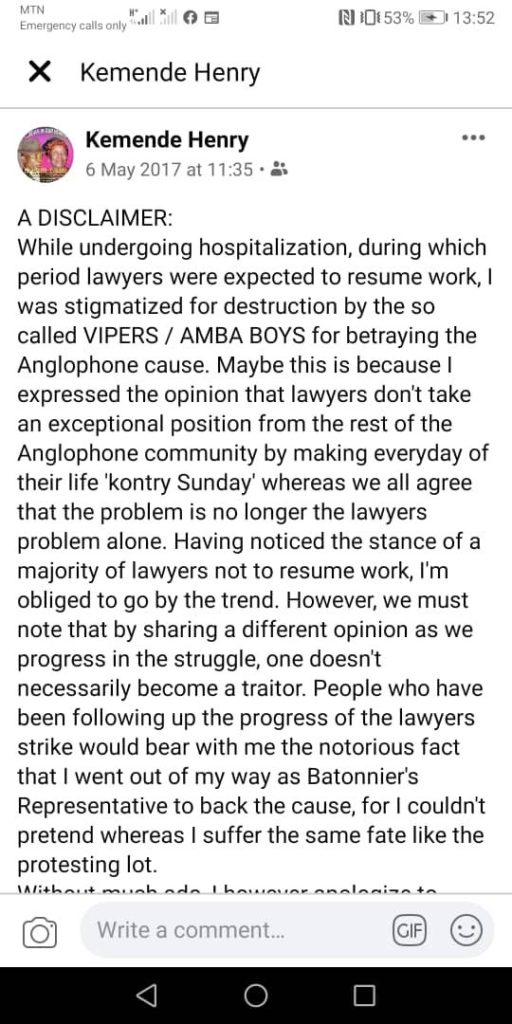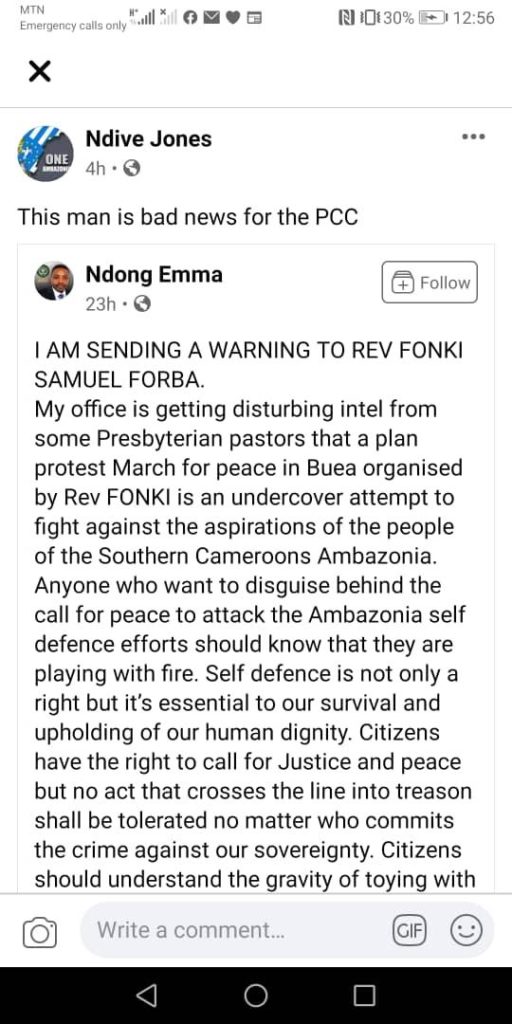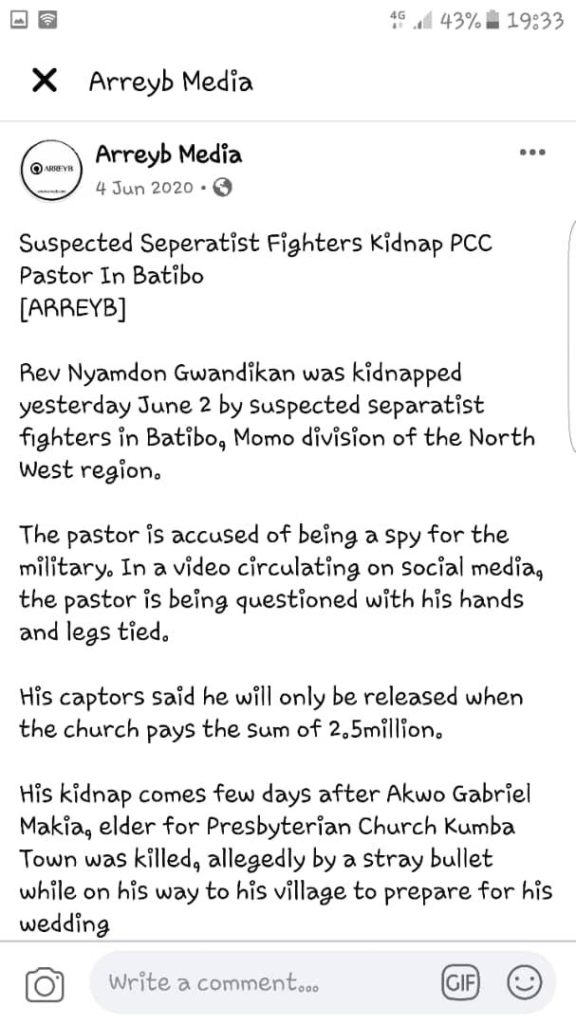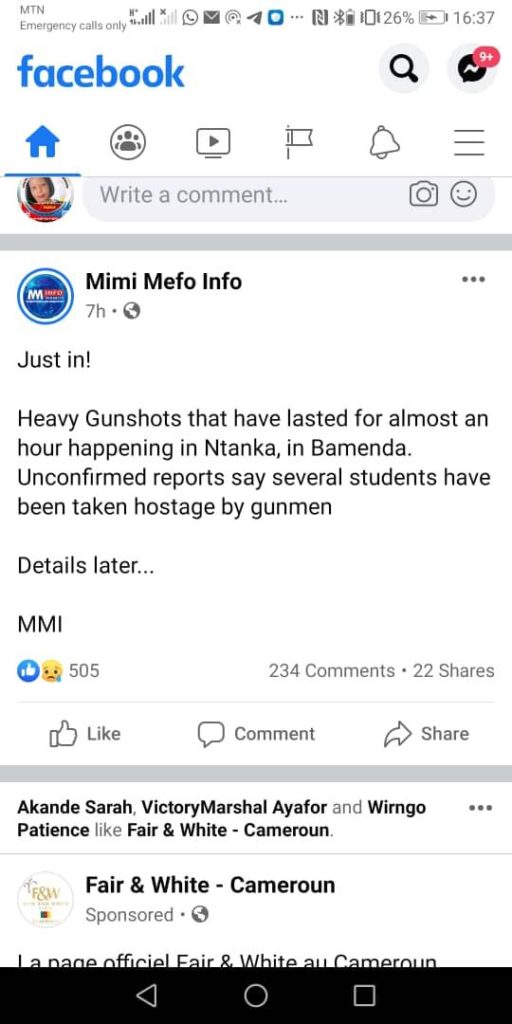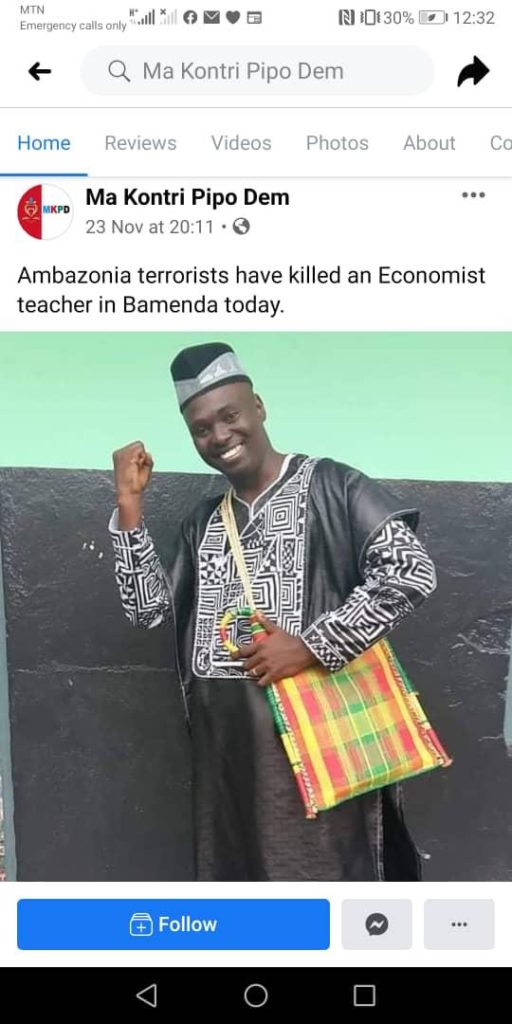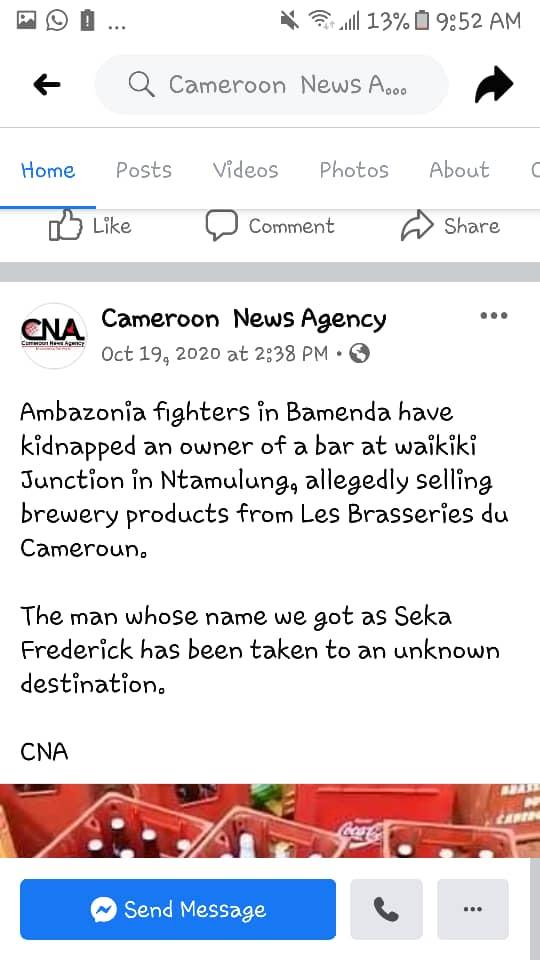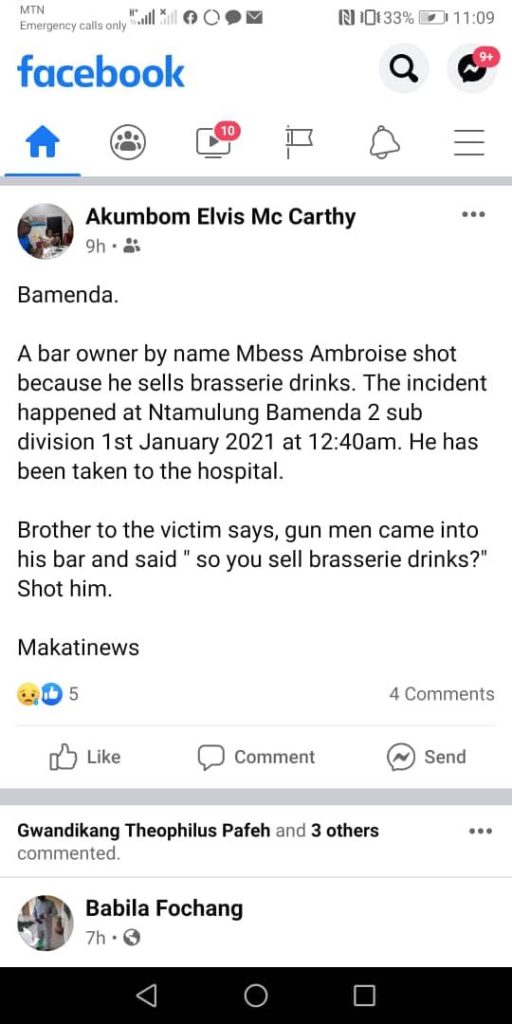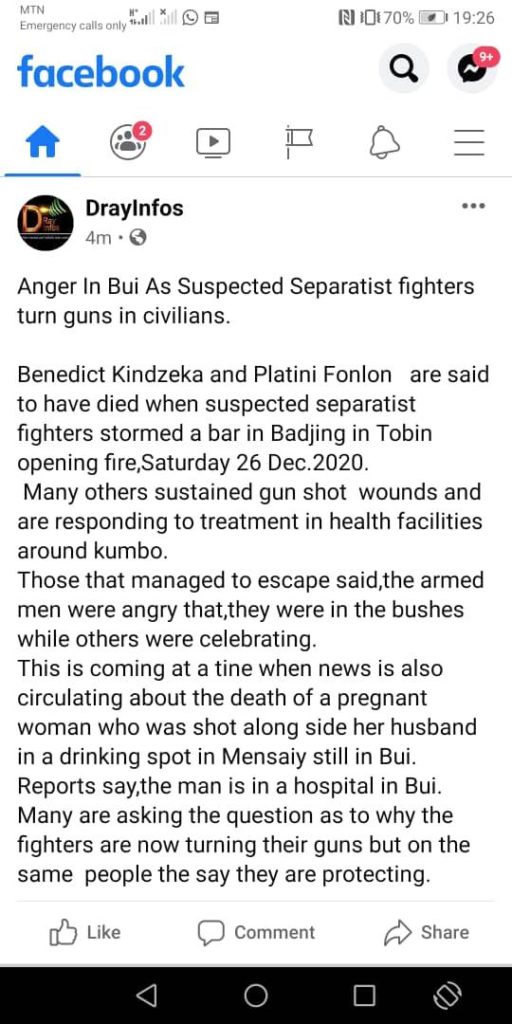Social Media’s role in promoting attacks on civilians in NW-SW Cameroon suspected to be traitors ‘’Black Legs,” or ‘Betraying the Struggle.’
Protests in October 2016 around the “Anglophone problem” addressing the marginalisation of the specific anglophone cultural, social, educational, and juristic practices in the two English-speaking regions were solely controlled with an intense military presence and security forces. The situation has escalated into an armed separatist conflict. The radicalisation of particular communities is still accelerating due to the lack of political, social, and economic alternatives, making the separatist movement attractive and appealing to specific groups. Civilians have been trapped between the fighting parties and are victimised for not supporting either party. Cases of attacks on civilians have been reported with accusing fingers pointing at various armed groups who target civilians suspected of being traitors or not promoting the separatists’ ideology. Social media has played a role in promoting such civilian attacks on a phenomenon known as ‘’black legs.’’
According to UNOCHA reports, the North-West and South-West (NWSW) regions of Cameroon remain in dire need of help as of September 2020 due to continuous attacks against civilians and their properties. Since 2016, growing violence between English-speaking separatists and central government forces in North-West and South-West Cameroon has uprooted 530,000 people from their homes. Facing attacks, physical and sexual violence, threats, kidnappings, killings, and villages’ burning, many people have fled to rural areas. They live in deplorable conditions in makeshift shelters in the forest. Others have relocated to cities living on the streets or with host families in overcrowded and unsanitary settings. There are several reports by human rights organisations about civilians’ execution in both regions by non-state armed groups (NSAGs) and government security forces.
The constant suspicion of civilian collaboration with state forces or non-compliance with the separatist movements’ agenda has increased their risk of facing attacks, physical and sexual violence, torture, maiming, threats, kidnappings, ransom payments, and killings. Social media has played a significant role in promoting such attacks on civilians suspected to be traitors, mainly by separatists movements; a phenomenon known as ‘’black legs. Violent attacks against civilians in Cameroon by separatist groups have been rife since the crisis started in late 2016 in the North-West and South-West regions of the country https://reliefweb.int/report/cameroon/cameroon-civilians-killed-anglophone-regions.
Young ladies have also been targets; lately, separatist fighters have accused them of dating military forces. A case in point is that of Treasure Keno, who was killed on 3rd August 2020, made headline news on social media and other young ladies within the North West and South West Regions of Cameroon. https://www.journalducameroun.com/en/cameroon-anglophone-crisis-accused-of-being-blackleg-treasure-pays-with-her-life/.
The same fate befell 24-year-old old Robertine Leinyuy on 14th December in the village of Ntseni in the Bui Division. Separatists fighters accused two other women of having sexual affairs with the Cameroon defence forces’ elements, as reported by Cameroon News Agency. Robertine was beaten to death while the two other ladies kidnapped and tortured in captivity for three weeks.https://www.facebook.com/652585094854545/posts/3465574746888885/.
The situation further compounded when not even human rights defenders were recently accused of betraying the struggle. The case of Barrister Agbor Balla and Barrister Kemende Henry, together with many others, have come under attack and have been accused as blacklegs by separatists’ fighters. Prominent human rights activist Agbor Balla as posted by a Facebook platform, Anglophone Bamilike, for betraying the struggle after being part of the struggle’s genesis. https://m.facebook.com/story.php?story_fbid=712466389264637&id=100015038467416
Legal luminary Barrister Kemende Henri experienced a similar incident. He had to issue a disclaimer on his Facebook wall on 6th May 2017, as he was stigmatised by “Amba Boys” for betraying the Anglophone course. https://m.facebook.com/story.php?story_fbid=1868946313323581&id=100006246914547
The attack on local leaders as betraying the struggle did not exempt religious authorities from being killed, attacked or threatened. Such is the case of the PCC Moderator and other religious and traditional leaders. They have come under attack either for collaborating with the state or spying in on the separatists’ fighters’ actions. As shared on the Facebook page of Ndive Jones, posted by Ndong Emma, on 26th December 2020, the Moderator PCC is accused of fighting against the aspirations of the Southern Cameroons Ambazonia.
On 2nd June 2020, a PCC Pastor in Batibo was kidnapped by suspected Separatist fighters as reporters by Arrey Media, accused of being a spy for the military. In videos and pictures that were trending on social media, the pastor was being questioned with his hands and legs tied. https://m.facebook.com/story.php?story_fbid=261438168535850&id=106265200719815
The education milieu within the two Anglophone regions is under attack as many teachers and students have been kidnapped for a ransom or killed in the line of duty. According to a prominent online platform, Mimi Mefo Info, Thursday, January 2021, unconfirmed reports several students were killed by gunmen alleged to be separatist fighters.https://www.facebook.com/1927380740639827/posts/3881932841851264/.
On 23rd November 2020, an Economics teacher was killed by alleged “Ambazonia terrorists”, according to a Facebook page, Ma Kontri Pipo Dem. https://www.facebook.com/100568171533589/posts/198045028452569/
Business persons continue to suffer attacks, especially those described as dealing with contraband goods such as brasseries drinks while customers, consuming such goods, or even taking part in festive seasons like Chrismas being brandished as blacklegs betraying the struggle. On 19th October 2020, Cameroon News Agency reported on the kidnap of a bar owner, Seka Frederick, for selling brasseries drinks. ://www.facebook.com/652585094854545/posts/3305333966246298/.
Early this year, 1st January 2021, another bar owner, Mbess Ambroise, was allegedly shot by separatist fighters for the same reason. https://www.facebook.com/100045962052935/posts/245996860275714/.
The same fate befell two bar owners who were attacked by gunmen and killed and the other kidnapped according to Cameroon News Agency; DrayInfos reported two civilians’ deaths on 26th December 2020, Benedict Kindzeka and Platini Fonlon, in Tobin Kumbo, for celebrating while they, Ambazonian fighters were in the bushes. https://www.facebook.com/111566296851867/posts/409945803680580/.
The attack on several civilians described as blacklegs has been attributed to people exercising their normal line of duty contrary to separatist ideologies, positions and interests, settling scores, envy and jealousy. This has led to the loss of businesses, rape and torture, kidnap, abduction and payment of ransom, maiming, brutal killings and much more.
With such rippling effects, it is very incumbent on peace actors and other relevant stakeholders to encourage the creation of social media platforms to counter the narratives, train bloggers and social media activists that can develop communication lines to counter violence online/offline while focusing efforts towards delivering advocacy messages to the warring parties especially to the armed groups with a focus on Human rights and dignity.
By Rosaline Obah

